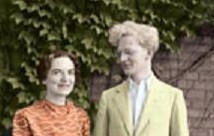Responding to Michael Dolzani:
Michael, am I right to think that in this wonderfully moving post you have actually brought a very personal example from Frye’s life to illustrate a distinction typical of his later works, the distinction between “purely” literary metaphor and what is beyond it: kerygma or existential or ecstatic metaphor? I take it you are saying that the so-called “liberal” phase is the phase of literature proper, when let’s say “heaven” is a symbol of something hypothetical, a vision of a spiritual interpenetrating world or “panoramic apocalypse”, something we contemplate as a hypothesis independently of its reality status. To say that Helen’s presence or heaven is surely more real for Frye than just her survival in people’s memories is to take us further than this, to the world of existential metaphor.
This takes me to what is the most significant sentence of your post: “I think the order of words is present, not as an empirical fact, but as Helen was present.” This has raised several questions for me. First, the later Frye identifies his own “order of words” as a hypothetical literary vision, an “ironic separation from all statement of facts”, adding that this is as far as he got in Anatomy (Myth and Metaphor 114). Or see this: “So the panoramic apocalypse, the thematic stasis, the myth as dianoia or picture, represents the end of experience as knowledge. It’s normally as far as literature can go, and the dianoia it reaches is a design of hypothetical metaphor.” (Late Notebooks I:91) What you suggest – that Helen’s presence expressed by the metaphor of heaven is more than hypothetical, and it is of the same nature with the order of words – is seemingly in contradiction with the above. Perhaps, to try to answer my own question, the solution lies in the nature of Frye’s dialectical thinking and the key word here is “normally”. What I mean is that kerygma is, on the one hand, definitely beyond literature (literature plus), on the other hand all literature is potentially kerygma. I find both poles of the dialectic in Frye.
My other question is related somewhat. If “the order of words” is not an empirical fact but a creative vision as you say, what then do we make of Frye’s science analogy in the Anatomy? I do not want to stray to the territory of the philosophy of science (where I am not at home), and I know that Frye later dropped the science analogy, what puzzles me though is that even in Spiritus Mundi he writes in a similar vein that the vision has an objective pole, that “the order of words is there, and it is no good trying to write it off as a hallucination of my own” (118). Now if what you suggest is that in fact Helen’s presence in heaven is neither simply literary metaphor for Frye, nor something “factual”, then it must be, well, yes, I have to say it, something like “religious truth”, in the best possible sense of the term. But I wonder how Frye would have reacted if someone had insisted, say that “the resurrection of Christ has an objective pole, the resurrection is there, and it is no good trying to write it off as a hallucination of the disciples.” I hope the parallel is clear.
Is it too far-fetched to say that whereas the claim for objectivity sits awkwardly within the thinking of a Blake disciple, perhaps the late Frye’s move towards “otherness” could logically lead towards an increased emphasis on objectivity, towards the hunch that reality might be more than our imaginative creation, that in fact reality – the text, if you like, in a very wide, postmodern sense − answers back? All in all, I would humbly suggest that in this respect Paul Ricoeur’s thinking is perhaps more balanced in some ways than Frye’s, the Ricoeur who in his book on metaphor has worked on a nuanced interpretation of mimesis, saying that “the enigma of metaphorical discourse is that it ’invents’ in both senses of the word: what it creates, it discovers; and what it finds, it invents” (Rule of Metaphor, 239).

